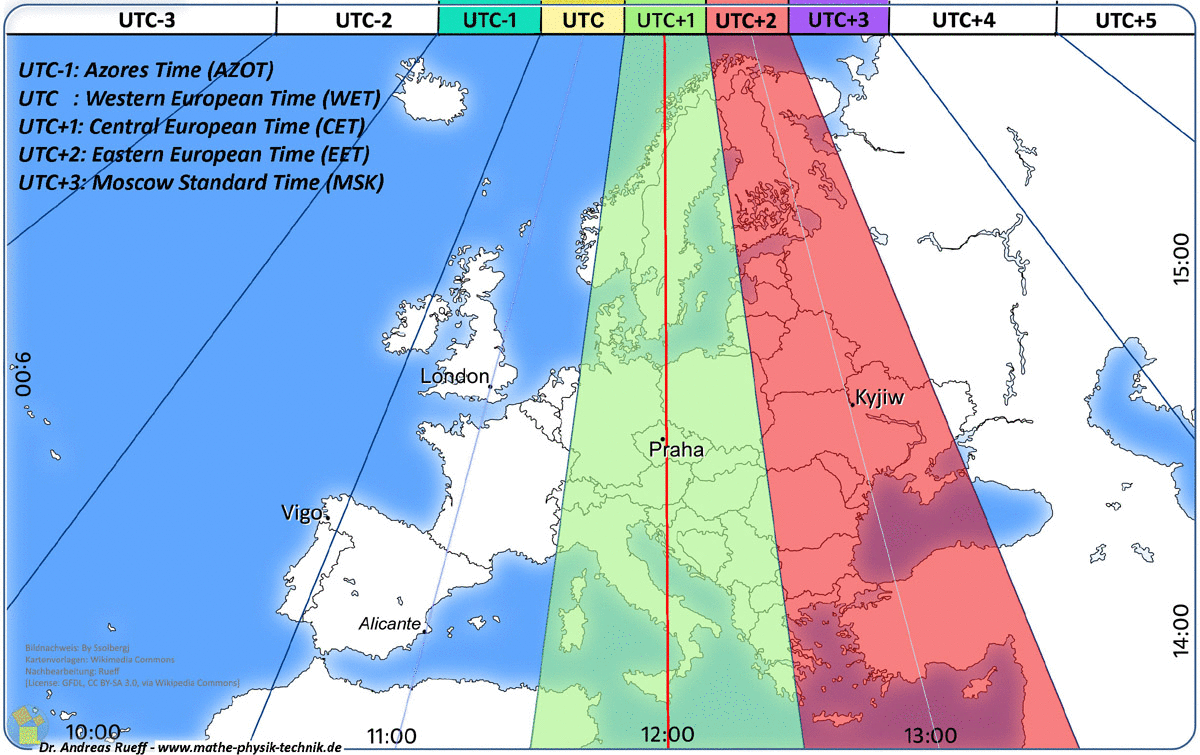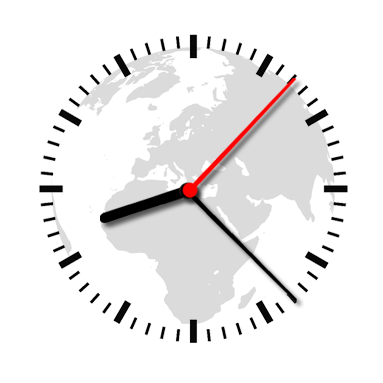Geen zomertijd, geen wintertijd, maar gezondtijd!
Dat is de eigen natuurlijke West-Europese tijdzone voor West-Europa:

➡️ Voor het laatste nieuws over het EU-voorstel, zie onze nieuwsbrieven in de zijbalk (of onderin als je dit op je mobiel leest). Op de hoogte blijven? Abonneer je!
Conclusies RIVM
Op 15 oktober 2019 concludeert het RIVM in haar rapport ‘Standaardtijd, zomertijd en gezondheid’ duidelijk:
Het verzetten van de klok is ongezond
Ook stelt het RIVM dat standaardtijd (UTC+1) beter voor de volksgezondheid is dan de ‘zomertijd’ (UTC+2) en dat het nóg beter zou zijn als Nederland de eigen geografische tijdzone (UTC) hanteert.
➡️ Het RIVM advies komt overeen met de conclusies van onze position paper, waarin wij uitleggen waarom afstappen van het verzetten van de klok en overgaan op de eigen natuurlijke tijdzone ook voor de rest van West-Europa een win-win oplossing is.
❓Hoe zit dat nu precies met zomertijd en wintertijd?
❓Wat zijn klokschakelingen en tijdzones?
❓Hoe en waarom heeft dat dan zo'n grote invloed op onze gezondheid, veiligheid en welzijn?
Dit alles en meer leggen wij uit in onze position paper 'Timing is everything', te downloaden in 4 talen vanuit de sidebar rechts of onderin.
➡️ Scroll naar beneden voor de inhoudsopgave en onze bronnen: een lijst van interessante artikels en onderzoeken uit de referenties van onze paper.
Over ons
Ga voor Gezondtijd! is een samenwerking tussen een aantal actiegroepen voor een gezonder tijdenbeleid in Nederland: Platform Betere Tijden, Standaardtijd en Stop de zomertijd, de klok moet terug (die de NL petitie heeft opgesteld en in 2017 aangeboden bij de EU). Naar aanleiding van het EU voorstel ‘Europese richtlijn einde klokschakelingen’ hebben wij in 2018 de krachten gebundeld om de nieuwe wetenschappelijke inzichten in dit complexe thema en haar brede maatschappelijke impact onder de aandacht te brengen.
Wij zijn uitgenodigd op de diverse expertsessies 'Einde klokschakelingen’ die het ministerie van Binnenlandse Zaken (BZK) gehouden heeft van oktober 2018 tot juni 2019. Op 15 augustus 2019 hebben wij onze position paper 'Timing is everything' aangeboden en toegelicht bij BZK. Deze hebben zij ter kennisgeving doorgestuurd aan het RIVM en ministerie van Volksgezondheid (VWS).
De auteurs van de position paper zijn Conny Bergé en Ticia Luengo Hendriks van Platform Betere Tijden. De inhoud van deze paper is gebaseerd op de laatste wetenschappelijke kennis en is op feiten gecontroleerd door chronobioloog, licht- en slaaponderzoeker dr. Marijke Gordijn.
'Timing is everything'
Inhoudsopgave:
SamenvattingDoel
1. Aanleiding
1a - Europese richtlijn einde klokschakelingen
1b - Stand van zaken Nederland
2. Achtergronden
2a - Ontstaan van tijdzones en standaardtijden
2b - Ontstaan van klokschakelingen
2c - Biologische klok en ritmes
2d - Het belang van slaap
2e - Chronotypes
2f - Sociale jetlag en tijdzones
2g - Het belang van licht
3. Maatschappelijke gevolgen
3a - Gezondheid
3b - Werk
3c - Onderwijs
3d - Verkeer en transport
3e - Veiligheid
3f - Energie en milieu
3g - Financieel-economische gevolgen
4. Conclusies
- Hoog tijd voor een Tijdenbeleid!
- Keuze Nederland
- Keuze Europa
Bijlage
- Referenties
- Over de auteurs
- Versiebeheer
Bronnen
Hier volgt een selectie van interessante artikels en onderzoeken gebruikt voor onze position paper. Handige uitleg over en samenhang tussen al deze onderwerpen lees je in onze position paper.
Overheidsinformatie
- Standaardtijd, zomertijd en gezondheid - Rapport RIVM, 15 oktober 2019
- Zomertijd en wintertijd - Informatie- en documentatie-pakket ministerie van BZK
- Seasonal changes of time - Informatie- en documentatie-pakket Europese Unie
- Seasonal clock changes in the EU - Informatiepagina van de EU Raad van Ministers
- Seasonal clock change in the EU - Informatiepagina van de EU Transport Raad
- Expert workshop voor de EU Transport Commissie op 21-01-2019, videoregistratie:
- Long distance travel – potential impacts (min. 16:00:08)
- Possible consequences on road safety (min. 16:08:10)
- Impacts on energy savings and energy markets (min 16:16:55)
- Potential health and well-being impacts (min 16:24:30)
- Observance of the system of European time zones - EU-rapport uit 2000 over o.a. luchtvervuiling
Wetenschappelijke standpunten
- Joint statement to the EU commission on DST - Gezamenlijk standpunt van de European Sleep Research Society (ESRS), de European Biological Rhythms Society (EBRS) en de Society for Research on Biological Rhythms (SRBR), 25 oktober 2018
- Zomertijd afschaffen - Gezamenlijk standpunt van de Nederlandse vereniging voor Slaap-Waak Onderzoek en de Slaapgeneeskunde Vereniging Nederland, 2018
- Impact of Daylight Saving Time on circadian timing system: An expert statement - Artikel in European Journal of Internal Medicine, 2018
- Why Should We Abolish Daylight Saving Time? - Position paper van de Society for Research on Biological Rhythms, 6 juni 2019
- Time to Show Leadership on the Daylight Saving Time Debate - Editorial in Journal of Clinical Sleep Research, 2019
- Overheid moet snel beslissing nemen over permanente zomer- of wintertijd - Standpunt Hersenstichting, 16 oktober 2019
Chronobiologie - Press kit on DST - Informatie- en documentatie-pakket van de Society for Research on Biological Rhythms
- Daylight Saving Time and Artificial Time Zones – A Battle Between Biological and Social Times - Artikel in Frontiers in Physiology, 2019
- Nobelprijs voor Fysiologie of Geneeskunde 2017 voor de grondleggers van de huidige kennis over de biologische klok
Gezondheid - The best thing you can do for your health: sleep well - Artikel in The Guardian, Matthew Walker, 2017
- Social jetlag – are late nights and chaotic sleep patterns making you ill? - Artikel in The Guardian 2019
- ‘Catching up’ on sleep on the weekend doesn’t work - Artikel van Colorado University, 2019
- Sleep Disorders and Sleep Deprivation: An Unmet Public Health Problem - Artikel van US Institute of Medicine, 2006
- How living on the wrong side of a time zone can be hazardous to your health - Artikel The Washington Post 2018
Economie
- Why sleep matters — the economic costs of insufficient sleep - Onderzoek internationale denktank Rand Corporation
- Effects of Daylight-Saving Time Changes on Stock Market Returns and Stock - Artikel in Psychological Reports 2013
- Sunset time and the economic effects of social jetlag: evidence from US time zone borders - Artikel Journal of health economics, 2019
Onderwijs
- Time to learn: How chronotype impacts education - Artikel in PsyCh Journal, 2017
- Is 8:30 a.m. Still Too Early to Start School? A 10:00 a.m. School Start Time Improves Health and Performance of Students Aged 13-16 - Artikel in Frontiers in Human Neuroscience, 2017
- Identifying the Best Times for Cognitive Functioning Using New Methods: Matching University Times to Undergraduate Chronotypes - Artikel in Frontiers in Human Neuroscience, 2017
Verkeer
- Impact of daylight saving time on road traffic collision risk: a systematic review - Artikel in British Journal of Medicine, 2017
Natuur en milieu
- City lights make air pollution worse - Bron PhysOrg.com, 2010
- The new world atlas of artificial night sky brightness - Artikel in Science advances, Licht-atlas en wereldwijde lichtvervuilingskaarten
- Signalen van brede gevolgen kunstlicht gevonden in natuur - Nederlands Instituut voor Ecologie, 2016
Aanbevolen boeken
- Paul Kelley, 2018: Body Clocks. The biology of time for sleep, education and work
- Matthew Walker, 2017: Why we sleep / Slaap
- Chris Pearce, 2017: The Great Daylight Saving Time Controversy
- Till Roenneberg, 2013: Internal time / Het innerlijke uurwerk
- The best thing you can do for your health: sleep well - Artikel in The Guardian, Matthew Walker, 2017
- Social jetlag – are late nights and chaotic sleep patterns making you ill? - Artikel in The Guardian 2019
- ‘Catching up’ on sleep on the weekend doesn’t work - Artikel van Colorado University, 2019
- Sleep Disorders and Sleep Deprivation: An Unmet Public Health Problem - Artikel van US Institute of Medicine, 2006
- How living on the wrong side of a time zone can be hazardous to your health - Artikel The Washington Post 2018
Economie
- Why sleep matters — the economic costs of insufficient sleep - Onderzoek internationale denktank Rand Corporation
- Effects of Daylight-Saving Time Changes on Stock Market Returns and Stock - Artikel in Psychological Reports 2013
- Sunset time and the economic effects of social jetlag: evidence from US time zone borders - Artikel Journal of health economics, 2019
Onderwijs
- Time to learn: How chronotype impacts education - Artikel in PsyCh Journal, 2017
- Is 8:30 a.m. Still Too Early to Start School? A 10:00 a.m. School Start Time Improves Health and Performance of Students Aged 13-16 - Artikel in Frontiers in Human Neuroscience, 2017
- Identifying the Best Times for Cognitive Functioning Using New Methods: Matching University Times to Undergraduate Chronotypes - Artikel in Frontiers in Human Neuroscience, 2017
Verkeer
- Impact of daylight saving time on road traffic collision risk: a systematic review - Artikel in British Journal of Medicine, 2017
Natuur en milieu
- City lights make air pollution worse - Bron PhysOrg.com, 2010
- The new world atlas of artificial night sky brightness - Artikel in Science advances, Licht-atlas en wereldwijde lichtvervuilingskaarten
- Signalen van brede gevolgen kunstlicht gevonden in natuur - Nederlands Instituut voor Ecologie, 2016
Aanbevolen boeken
- Paul Kelley, 2018: Body Clocks. The biology of time for sleep, education and work
- Matthew Walker, 2017: Why we sleep / Slaap
- Chris Pearce, 2017: The Great Daylight Saving Time Controversy
- Till Roenneberg, 2013: Internal time / Het innerlijke uurwerk
